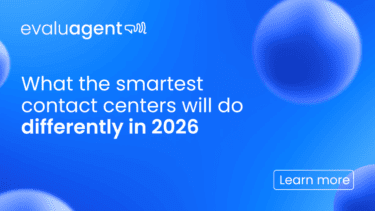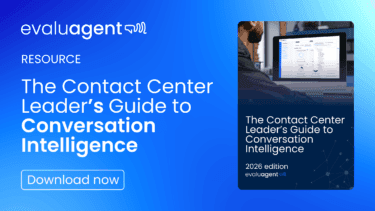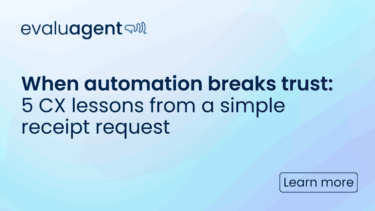As a contact centre manager, how can you keep on top of how well your agents are performing?
One option, of course, is to rely on customer feedback and look at trends in customer data. Are your customers sticking around longer and spending more with the company? Are your NPS and CSAT scores increasing or decreasing? All of these are useful metrics to track.
The other half of the equation is a commitment to setting and monitoring the standards you expect from your agents internally. This is called Quality Assurance (QA) or Internal Quality Score (IQS), and adds a level of individual performance feedback that you can’t get from Customer Feedback or Productivity metrics alone.
It also pinpoints areas of improvement for each agent, so they’re empowered to improve their own performance. Your workforce becomes better skilled and more engaged, and delivers better outcomes for both your customers and your performance as a result.
Below, we run you through what QA is, how it works and why, now more than ever, your business needs to invest in it.
What is QA exactly?
QA is a way to observe contact centre interactions and measure the standard of service that agents deliver.
If you commit to doing it well, and take advantage of smart, data-driven insights from up-to-date monitoring tools, QA creates an accurate picture of the customer experience your contact centre currently provides.
From here, you can evaluate agent performance and take action to improve it, so that agents are able to have better conversations and make less mistakes. The overall performance of your contact centre increases as a result through:
- Customer retention: customer loyalty increases as your agents become better at handling interactions via feedback, call center coaching training.
- Operational efficiency: your agents are empowered to manage more complex interactions more effectively, so your contact centre processes more interactions in a smaller amount of time
- Error reduction: automated QA processes, agent feedback and instant access to key customer information combine to reduce costly and avoidable repeat contacts.
How does the QA process work?
Your QA team will score a selection of calls against a set of criteria defined by the contact centre. These vary from organisation to organisation, but usually involve:
- Ability to adhere to processes and other guidelines
- Ability to control the interaction with the customer
- Ability to share relevant information and fulfill customer needs or resolve an enquiry
- Ability to build a relationship with the customer
Using this scoring system, you can identify individual agents’ strengths and weaknesses, and pinpoint any areas that you need to work on as an organisation.
From here, you can take action to iron out any pain points. You might opt to send agents on a refresher training course, for example, or upskill a few top performers so they can deal with more complex issues effectively.
Why is QA mission critical?
The QA scoring process collects data that’s granular enough to offer impactful feedback and drive improvements across the entire contact centre. Whilst this has always been important, it now drives customer experience improvements that have become essential in standing out from your competitors.
Customer expectations have never been higher with regard to service levels. With the ease of comparison access to the internet offers, customers are increasingly choosing to spend their money with companies that offer them a great overall experience.
According to a recent PwC report:
- 73% of consumers consider customer experience an important factor in their purchasing decisions
- Consumers will pay up to a 16% price premium if a company offers a great customer experience
- One in three customers will walk away from a brand they love after one bad experience
Companies are rapidly waking up to the draw that a standout customer experience offers – particularly post-pandemic as they look to max out on new tech investments and maintain the customer focus that saw them through 2020.
In this environment, optimising your contact centre to provide the best levels of service possible is mission critical – and a well-implemented QA strategy is the way to get there.
Traditional QA is broken. Opt for smart quality instead
Most contact centres have some QA processes in place, but how they implement them often limits how useful they are.
They choose the wrong calls to evaluate. Their evaluation forms measure the wrong things. They duplicate effort, which results in limited coverage and out-of-date recommendations. As a result, their reports offer little in the way of useful insight. Agents see them as an ineffective intrusion from above, and in some extremes senior managers dismiss these reports too.
It doesn’t have to be this way.
Recent advances in automation technology have significantly expanded what QA can offer your contact centre. When you combine these with a people-centred approach based around agent empowerment, QA can result in meaningful CX improvements that help you stand head and shoulders above the competition.
We call this the Smart Quality approach to QA, and it can be broken down into roughly three stages:
- Identify: use customer feedback, performance data and text analytics to quickly identify conversations that require your attention. Every call is auto scored for compliance and CX, but your QA team only reviews the conversations that matter.
- Empower: free your QA team to deliver genuinely valuable insight with flexible, multichannel scorecards. Empower your agents with real-time alerts, one-to-ones and e-learning options.
- Inform: create useful and up-to-date performance reports your business can act on. Track efficiency gains, sales and employee and customer satisfaction over time to make sure your contract centre is on an upward trajectory.
With the right approach, the right technology and the right support, QA can be your contact centre’s secret weapon in creating a standout customer experience.
At EvaluAgent, we combine the latest and best in QA technology with a people-centred approach designed to engage your workforce and inspire performance improvement. Our clients have seen a 6% increase in CSAT scores and a 10% reduction in AHT.
Interested in learning more? Explore EvaluAgent for yourself with a free trial or let us demonstrate the power of Smart Quality with a no-obligation demo.




